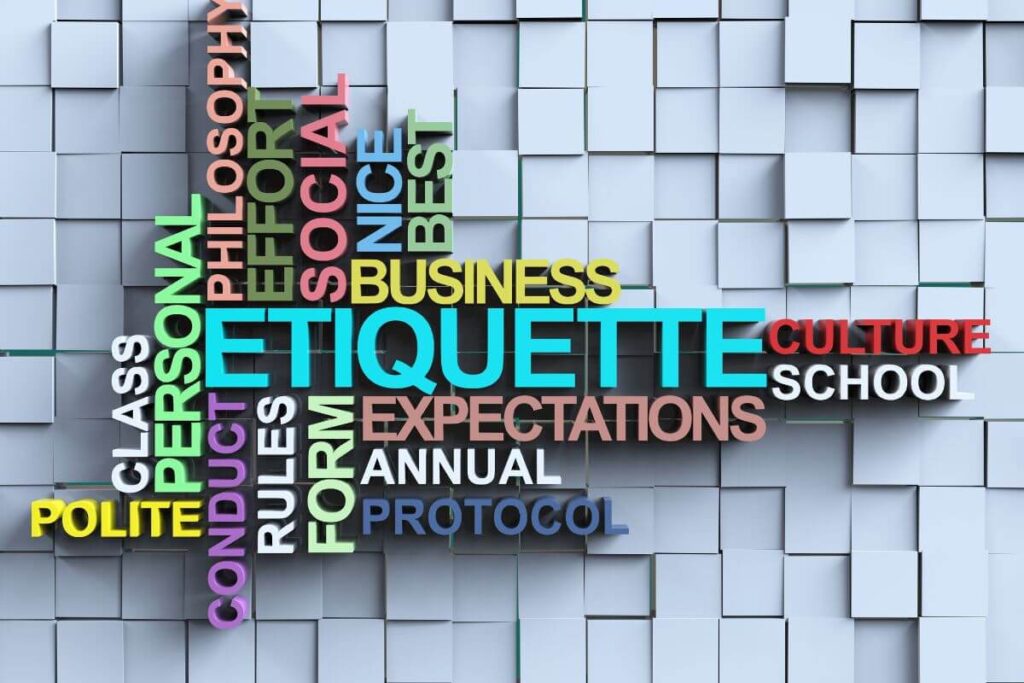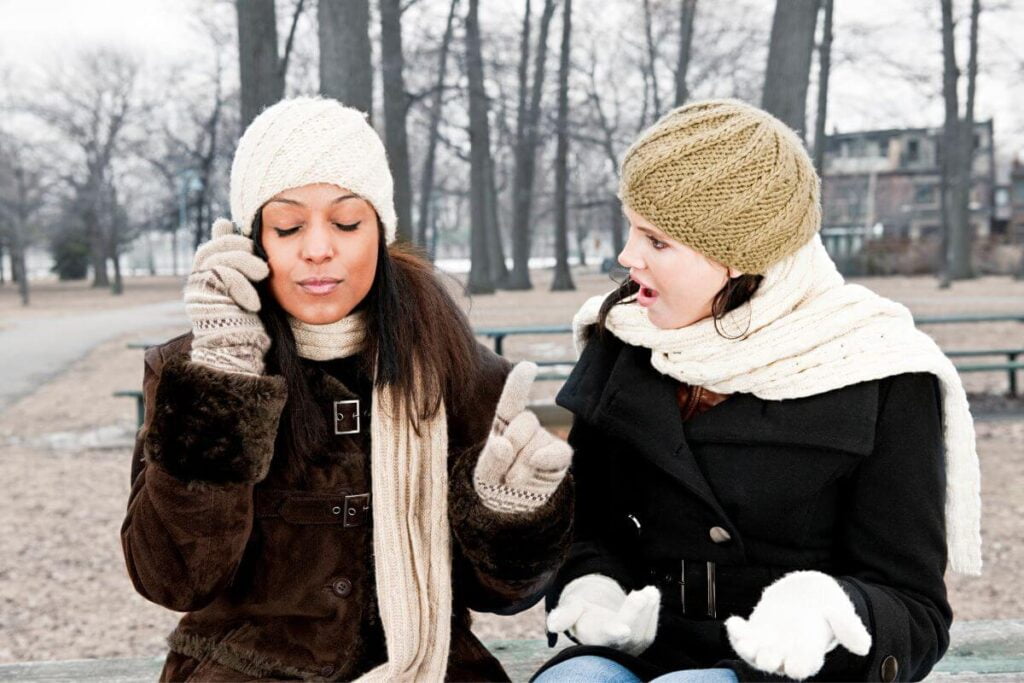What is Etiquette and Why is it Important?
From a young age, we are taught to be polite, to be considerate, to speak correctly, to be respectful, to use good manners, to be punctual, and many more behaviors that are considered good etiquette. But what is etiquette and why is it important? In this article, we are going to answer these questions.
Using proper etiquette should be part of your ongoing personal growth and development plan throughout your life. There is never a reason not to use proper etiquette — so let’s learn more about it.

What is Etiquette?
Etiquette is a common set of rules for personal behavior, usually based on an ethical code that delineates expected and accepted social norms and conventions within a society, a social class, or a social group.
Rules of etiquette refer to a common sense set of rules that you follow in your everyday life and social interactions, as well as your office environment and professional life.
Following the rules of etiquette helps you make a good first impression when meeting new people and helps you develop better relationships. It shows you are showing respect to yourself and others.
Basic Etiquette Examples
- Make eye contact while talking with someone.
- Use appropriate table manners at the dining table.
- Give your full attention to someone who is speaking to you.
- Follow the expected dress code rules for events and places.
- Treat people on social media as if you are face-to-face.
- Use a firm handshake when meeting someone.
- Don’t play with your cell phone at the table or when talking to someone.
- Be aware of your tone of voice in everyday interactions.
- Use indoor voices and polite behavior in public settings.
- Respect the personal space of others.
- Don’t take personal phone calls during meetings.
- Use proper grammar when speaking with others.
- Use “Magic Words” such as please, thank you, you’re welcome, hello, etc.
- Do not talk with your mouth full of food.
The Golden Rule is another example of proper etiquette — “treat others the way you would like to be treated.”
These are examples of etiquette you should follow in all settings and circumstances just to show you are a respectful and considerate human being.
Related Article: 10 Golden Rules for Success and Happiness in Life
Types of Etiquette
There are also specific types of rules for a variety of settings and situations that encounter on a regular basis. You should know and follow the different Principles of Etiquette for each. Principles of etiquette consist of the customary code of behavior that people are expected to observe and practice in a specific setting.
These are some examples of specific settings and situations that have specific rules of etiquette:
- Wedding etiquette
- Church etiquette
- Meeting etiquette
- Buffet etiquette
- Office etiquette
- Shopping mall etiquette
- Corporate etiquette
- Bathroom etiquette
- Telephone etiquette
- Email etiquette
- Business etiquette
- Etiquette for social situations
- Etiquette for social events
- Electronic communication etiquette
Consider the set of guidelines we should all use in public restrooms. Wait your turn, check for toilet paper, clean the seat, flush the toilet, wash your hands, wipe the counter, use a paper towel to open the door… all of these behaviors make up the set of etiquette guidelines for a public restroom. If each person leaves the bathroom in a better condition than they found it, wouldn’t it be a good way to make a difference in our world and send a message that you are considerate of the next person? And hopefully the next person will do the same.
Another example is wedding guest etiquette. Think about the set of guidelines we should use when attending a wedding. We know it’s polite to bring a gift, wear nice clothing, be clean and well-mannered, use quiet voices, be on time, put your mobile phone away, and greet the newly married couple. It’s also proper to RSVP in a timely manner when invited to a wedding. These are examples of good etiquette that will contribute to a positive wedding experience for all.
If you are a cultured individual who wants to make a good impression and develop a good rapport with people, you probably understand and follow basic etiquette rules in a variety of settings and situations.
How to Learn All Types of Etiquette
Proper etiquette can be associated with good manners, good behavior, a good set of values, kindness, and respect. Etiquette training should begin in childhood and should be a lifelong learning process.
Emily Post, the American author and socialite who became famous for writing about etiquette in the mid-twentieth century, believed that good manners begin with consideration for the feelings of others. She believed that conversational etiquette, knowledge of proper social graces, and charm were all important components of proper etiquette.
Today the Post family continues her work through the Emily Post Institute:
The Emily Post Institute Inc. is a fifth generation family business that has been promoting etiquette based on consideration, respect and honesty since Emily Post wrote her first book ETIQUETTE in 1922.
If you have any questions about etiquette, you can find answers from the Emily Post Institute! But you can also learn proper etiquette from observing people around you in different settings, reading magazines and books, and honoring basic rules of kindness and respect.

Why is Etiquette Important?
Why is etiquette important in life? There are many benefits of using proper etiquette. You might have even thought of some benefits while you were reading about the meaning of good etiquette.
Here are 9 of the most important reasons to use good etiquette:
1. Proper etiquette boosts self-esteem and confidence.
When we know how others expect us to act and we can easily follow those expectations, we feel more comfortable being our authentic selves within those boundaries.
2. Good etiquette promotes effective communication.
Using proper etiquette for communication ensures a clear and better level of communication between people as it breaks unnecessary barriers that are standing in the way of open communication. Active listening and waiting your turn to speak are important rules of etiquette that are particularly important and effective.
3. Etiquette promotes stronger relationships.
Proper etiquette helps people feel more comfortable and at ease because it shows that you value and respect others. It also sends the message that you respect relationships that you are forming. Etiquette promotes kindness, consideration, and humility. These qualities prove beneficial as they help create stronger relationships and friendships.
4. Etiquette promotes healthy life skills.
Demonstrating good manners and etiquette helps develop your critical life skills such as compassion, kindness, patience, respect, self-control, self-awareness, focus, decision-making, and even problem solving skills. All of these qualities add up to set of critical life skills that will carry you farther in your social and professional life.
5. Etiquette promotes career advancement.
It opens doors to new opportunities and enhances your status in the workplace. People will consider you more capable, intelligent, and professional than the others.
6. Proper etiquette helps you create strong and lasting first impressions.
This will help you in your personal life and professional life. The first few seconds after you meet someone are critical. Make sure your smile is cordial and warm. Make sure you are being respectful and using good manners. It could make a big difference in how people respond to you and remember you.
7. Good etiquette inspires others.
Common courtesy, kindness, and good etiquette inspires others to demonstrate the same behaviors. Consequently, if we all practice good etiquette in our everyday lives, It helps create a more kind and gentle world.
8. Principles of etiquette teach us about cultural differences.
Different cultures have different rules of etiquette. So if you are traveling, it’s always best to do some research and know the basic rules of etiquette for new places. Knowing what’s expected and how to act will help you feel more relaxed and able to enjoy yourself more freely.
9. Rules of etiquette protect the feelings of others.
Proper etiquette tells us to never criticize or make fun of others. We should always treat others positively. It’s not necessary, plus it’s not polite, to make people feel bad about themselves. These rules of etiquette are basic kindness rules that cross all boundaries and cultures.
As you can see, there are many reasons why good etiquette is important in life. Using proper etiquette shows that you are putting forth your best effort to demonstrate personal conduct that is respectful and polite. People around you will appreciate your efforts and respond positively.

Final Thoughts
In summary, using good etiquette and manners indicates to others that you are kind, respectful and courtesy. Good etiquette is a great way to demonstrate that you care about other human beings.
I hope this article has helped you understand the importance of etiquette in your life, and the positive impact you can have on others. No one is always going to demonstrate perfect etiquette, but there are simple rules of etiquette that will certainly make a difference in the world.
True etiquette is fluid and constantly changing with societal changes. You can’t really keep up with every new “rule,’ but you can always behave in a kind and caring manner that reflects self-respect, and respect for others, right?
Love too ALL! ! Susan







